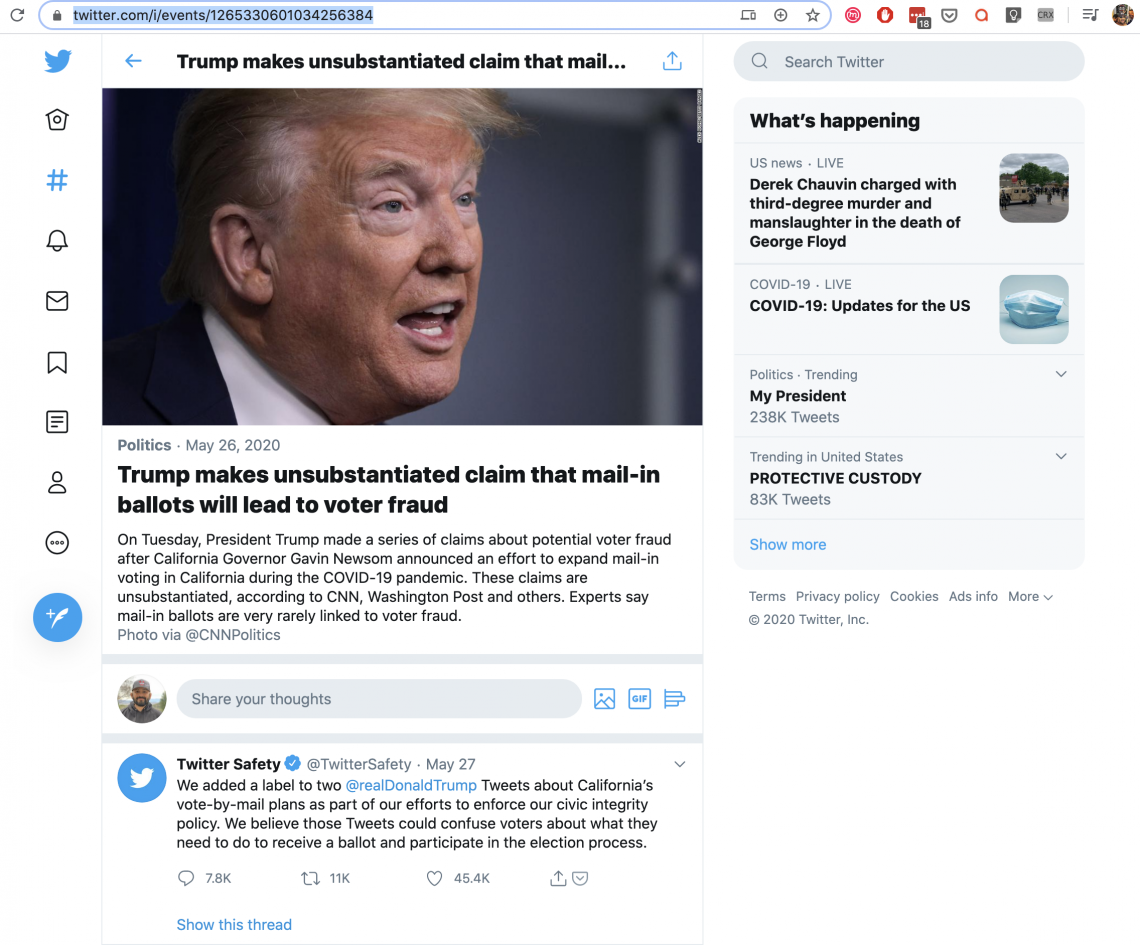Social Platforms Should Not Be Arbiters of Truth
President Trump, the current US president, recently shared a post on Twitter sharing his beliefs on the new move for more mail-in Ballots in California. In it he talked to the risks, from being substantially fraudulent, to the theft, and forgery.
Twitter decided that this was the right time to introduce their fact-checking service. They did so by appending the following to the tweet:

When you click on the link, they refer you to the following:

As you scroll through the the various articles in the stream, one thing should be apparent. The “facts” are being checked and discounted via media sources. There are few, if any, peer reviewed studies or analysis being referenced. For every article you find saying there is no risk of mail-in ballots, there are just as many showing there is.
This is extremely wrong, and we have yet to appreciate the full ramifications of a decision like this.
I think Mark Zuckerberg said it best:
I don’t think Facebook or internet platforms in general should be arbiters of truth.
CNET Interview: Mark Zuckerberg
Communications Decency Act (CDA)
Since, President trump has signed an executive order that is designed to peel the layers back on something few are aware of: 230(c) of the Communications Decency Act (section 230(c)). 47 U.S.C. 230(c). This Act was enacted in 1996 to help regulate pornographic material, but it also introduced things like Section 230 (a bit ironic).
This section of the Act is designed to do one thing: protect freedom of expression and innovation on the Internet.
No provider or user of an interactive computer service shall be treated as the publisher or speaker of any information provided by another information content provider (47 U.S.C. § 230, a Provision of the Communication Decency Act)
Why is this important?
This Act protects companies like Twitter, Facebook, Google and so many others from being held liable for what others might say or do on their platforms. The President going after this is a very interesting move, and one that I’m sure a lot of attorney’s are feverishly putting countless hours against to build defensible positions.
This one section has allowed free speech and innovation to flourish on the internet, and coincidently a majority of those platforms are US companies for that very reason.
This section of the EO is especially interesting and paints a very clear picture where this can, and will likely go as we get closer to the elections:
Section 230 was not intended to allow a handful of companies to grow into titans controlling vital avenues for our national discourse under the guise of promoting open forums for debate, and then to provide those behemoths blanket immunity when they use their power to censor content and silence viewpoints that they dislike. When an interactive computer service provider removes or restricts access to content and its actions do not meet the criteria of subparagraph (c)(2)(A), it is engaged in editorial conduct. It is the policy of the United States that such a provider should properly lose the limited liability shield of subparagraph (c)(2)(A) and be exposed to liability like any traditional editor and publisher that is not an online provider.
Power and Responsibility
Social platforms are an integral part of our digital existence, they yield immeasurable power over the global society. Said power carries with it a debt of responsibility, to the internet as a whole and its users.
These platforms have the ability amplify movements, topple governments, form opinions, define and create governments, establish personal, professional and political opinions, and things I can’t even imagine right now.
Allowing a platform to define what truth is wrong, and scary. The only thing that has ever kept that at bay in my mind is the idea that the information is unencumbered, it’s flowing and it’s on you – the individual – to determine what you believe, determine your truth.
That is not the case any more.
What’s more distressing is this only adds to the gross overreach we continue to see across all platforms. To put into perspective, in just the last 2 months:
- YouTube has started to block and remove content they don’t believe to be in accordance with other authorities;
- Facebook is removing events they deem hazardous according to their rules;
- Twitter is cherry picking who to fact-check, and referencing media sources as facts – because media never gets it wrong;
A platform that chooses what is “right” and “wrong” is a platform that oversteps the their authority and breaks the bond between itself, the internet and its users. We don’t have to go too far in history to see what happens when a platform, body of people, are given that level power.
